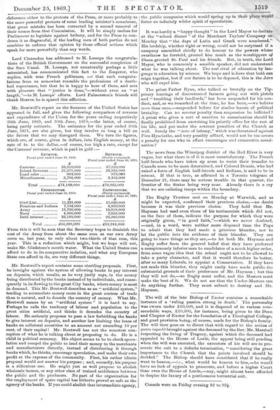Mr. Boutwell's report contains some startling proposals. First, lie inveighs
against the system of allowing banks to pay interest on deposits, which results, as he very justly says, in the money being distributed by the banks instead of by individuals, and conse- quently in its flowing to the great City banks, where money is most in demand. This Mr. Boutwell describes as an " artificial system," tending to accumulate money more in the great centres of trade than is natural, and to denude the country of money. What Mr. Boutwell means by an " artificial system " it is hard to say. Perhaps he calls the tendency of labour and population to the great cities artificial, and thinks it denudes the country of labour. He seriously proposes to pass a law forbidding the banks to give interest on deposits, and another law limiting the loans of banks on collateral securities to an amount not exceeding 10 per cent. of their capital ! Mr. Boutwell has not the remotest con- ception of what he is talking about or proposing to do. He is a child in political economy. His object seems to be to check specu- lation and compel the public to lend their money to the merchants and manufacturers directly, instead of distributing it through banks which, he thinks, encourage speculation, and make their own profit at the expense of the community. First, his rather idiotic proposal would not answer his purpose ; and, secondly, his purpose is a ridiculous one. He might just as well propose to abolish wholesale houses, or any other class of trained middlemen between the public and the producers. No part of the organization for the employment of spare capital has hitherto proved so safe as the agency of the banks. If you could abolish that intermediate agency, the public companies which would spring up in their place would foster an infinitely wilder spirit of speculation.


































 Previous page
Previous page